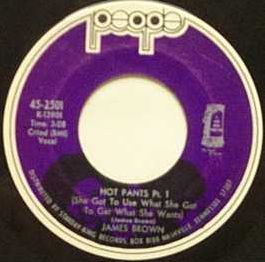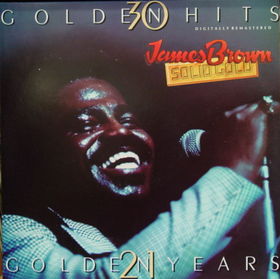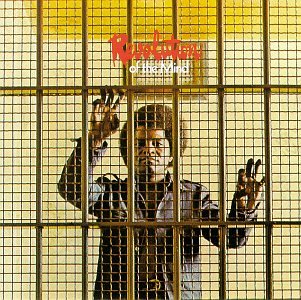Related Research Articles

"Funky Drummer" is a single released by James Brown in 1970. Its drum break, improvised by Clyde Stubblefield, is one of the most frequently sampled music recordings.

Fred Wesley is an American trombonist who worked with James Brown in the 1960s and 1970s, and Parliament-Funkadelic in the second half of the 1970s.

This is a discography chronicling the musical career of James Brown. Brown joined Bobby Byrd's vocal group The Flames in 1953, first as a drummer, and then as leading front man. Later becoming The Famous Flames, they signed with Federal Records in 1956 and recorded their first hit single, "Please, Please, Please", which sold over a million copies.

"Say It Loud – I'm Black and I'm Proud" is a funk song performed by James Brown, and written with his bandleader Alfred "Pee Wee" Ellis in 1968. It was released as a two-part single which held the number-one spot on the R&B singles chart for six weeks, and peaked at number ten on the Billboard Hot 100. Both parts of the single were later included on James Brown's 1968 album A Soulful Christmas and on his 1969 album sharing the title of the song. The song became an unofficial anthem of the Black Power movement.

The Payback is the 37th studio album by American musician James Brown. The album was released in December 1973, by Polydor Records. It was originally scheduled to become the soundtrack for the blaxploitation film Hell Up in Harlem, but was rejected by the film's producers, who dismissed it as "the same old James Brown stuff." A widely repeated story—including by Brown himself—that director Larry Cohen rejected the music as "not funky enough" is denied by Cohen. On the DVD commentary track for Black Caesar, Cohen states that executives at American International Pictures were already unhappy with Brown for delivering songs much longer than expected on Black Caesar and Slaughter's Big Rip-Off and opted for a deal with Motown Records instead. Cohen said the absence of Brown's music from Harlem still "breaks [his] heart."
"Soul Power" is a song by James Brown. Brown recorded it with the original J.B.'s and it was released as a three-part single in 1971. Like "Get Up Sex Machine" and other hits from this period it features backing vocals by Bobby Byrd. It charted #3 R&B and #29 Pop.
Ultimate Breaks and Beats was a series of 25 compilation albums released from 1986 to 1991 by Street Beat Records and edited by "BreakBeat Lou" Flores. Featured on the albums were funk, R&B, soul, jazz and rock tracks from the 1960s to 1980s that included influential drum breaks.

"The Payback" is a funk song by James Brown, the title track from his 1973 album of the same name. The song's lyrics, originally written by trombonist and bandleader Fred Wesley but heavily revised by Brown himself soon before it was recorded, concern the revenge he plans to take against a man who betrayed him. The song is notable for its sparse, open arrangement and its use of wah-wah guitar – a relative rarity in Brown's previous funk recordings. Released as a two-part single in February 1974, it was the first in an unbroken succession of three singles by Brown to reach #1 on the R&B charts that year – the last chart-toppers of his career. It also peaked at number 26 on the Billboard Hot 100. It was his second, and final, single to be certified gold by the RIAA.

"The Grunt" is a funk instrumental recorded in 1970 by James Brown's band The J.B.'s. It was released as a two-part single on King. It was one of only two instrumental singles recorded by the original J.B.'s lineup with Bootsy and Catfish Collins. Large parts of "The Grunt"'s melody and arrangement are borrowed, uncredited, from The Isley Brothers' song "Keep on Doin'", which was released earlier in the same year.

"Hot Pants (She Got to Use What She Got to Get What She Wants)" is a 1971 song by American singer James Brown, released as a single on his People Records label (then distributed by King Records) in July of that year with "Pt. 1" on the A-side and "Pt. 2 and 3" on the B-side. It was a number-one hit on the Billboard R&B chart, and reached number fifteen on the Hot 100 and number ten on the Cashbox magazine charts. "Hot Pants" was Brown's final release under King's purview before he and the People label moved to Polydor Records.

"Make It Funky" is a jam session recorded by James Brown with The J.B.'s. It was released as a two-part single in 1971, which reached No. 1 on the U.S. R&B chart and No. 22 on the U.S. Pop chart.

"Funky President (People It's Bad)" is a funk song by James Brown. Released as a single in 1974, it charted No. 4 R&B. It also appeared on the album Reality. According to Brown the "funky president" of the song's title was meant to refer to U.S. President Gerald Ford, who had succeeded Richard Nixon in the White House shortly before it was recorded.
"My Thang" is a funk song written and recorded by James Brown. Unlike most of his songs, this song was released not as a two-part single, but instead issued with three different B-sides. It spent two weeks at number one on the R&B singles chart - Brown's second #1 in a row, following "The Payback" - and reached No. 29 on the Billboard Hot 100 in July 1974. The song also appeared on Brown's 1974 double album Hell.

Love, Power, Peace: Live at the Olympia, Paris, 1971 is a live album by James Brown. It is the only recording that documents one of his live performances with the original J.B.'s lineup featuring Bootsy and Catfish Collins. Love, Power, Peace was originally intended for a 1972 release as a vinyl triple album, but was cancelled after the key members of the original J.B.'s left Brown to join Parliament-Funkadelic. The album was finally released for the first time in 1992, edited down for a single compact disc; the full show, using Brown's original mixdown was later released in July 2014 on Sundazed Records.
"Talkin' Loud and Sayin' Nothing" is a funk song written by James Brown and Bobby Byrd. Recorded in 1970 by Brown and the original J.B.'s with Byrd on backing vocals and updated with a new melody, it was twice released as a two-part single in 1972. It also appeared on the album There It Is.

Solid Gold: 30 Golden Hits, also called 30 Golden Hits/21 Golden Years, is a greatest hits compilation album by James Brown. The double album set was initially released in 1977 on Polydor, and was re-released by the label in 1986. The album's liner notes listed the release dates and U.S. chart positions for each song and included an essay by Cliff White. This is the first compilation album to include Get Up(I Feel Like Being a) Sex Machine. According to Allmusic reviewer William Ruhlman, the collection was "state-of-the-art", an influential model "not only...for the many Brown compilations that would follow in later years, but also for the compilation boom in general". In 1981, Village Voice critic Robert Christgau described it as "an essential collection." Allmusic indicates that it supplies "the essence of James Brown", but also states "[i]t has since been superseded by the 1991 four-disc Star Time boxed set".

Make It Funky – The Big Payback: 1971–1975 is the fourth of several James Brown era overviews released by Polydor Records in 1996. Expanding on the 1984 LP compilation Doing It To Death – The James Brown Story 1970–1973, it covers 1971–1975.

Revolution of the Mind: Live at the Apollo, Volume III is a live double album by James Brown released in 1971. As its subtitle suggests, it is Brown's third album recorded at the Apollo Theater, following the original Live at the Apollo (1963) and Live at the Apollo, Volume II (1968).
"I Cried" is a song written by James Brown and Bobby Byrd. It was originally recorded in 1963 by Tammy Montgomery, better known as Tammi Terrell, for Brown's Try Me Records. It was her first charting single, reaching #99 on the Billboard Hot 100.
"I Got Ants in My Pants (and I Want to Dance)" is a funk song by James Brown. Recorded in 1971 and released as a two-part single in November 1972 or January 1973, it charted #4 R&B and #27 Pop. It did not receive an album release. A remixed version was included on the 1988 compilation album Motherlode, Part 1 to Star Time and the whole cut again in Make It Funky: The Big Payback.
References
- ↑ Whitburn, Joel (2004). Top R&B/Hip-Hop Singles: 1942-2004. Record Research. p. 85.
- ↑ White, Cliff (1991). "Discography". In Star Time (pp. 54–59) [CD booklet]. New York: PolyGram Records.
- ↑ "Hits of the Week" (PDF). Record World. February 19, 1972. p. 1. Retrieved 2023-04-02.
- ↑ Leeds, Alan, and Harry Weinger (1991). "Star Time: Song by Song". In Star Time (pp. 46–53) [CD booklet]. New York: PolyGram Records.
- ↑ Leeds, Alan M. (1996). Discography. In Make It Funky: The Big Payback 1971–1975 (pp. 16-19) [CD liner notes]. London: Polydor Records.
- ↑ Video of Scallions cover on YouTube
- ↑ "Search Results for "king heroin" | WhoSampled". www.whosampled.com. Retrieved 2016-04-12.
- ↑ Truth Hurts's Smoke sample of James Brown's King Heroin (with a list of other songs that sampled it)
- ↑ Truth Hurts's Smoke sample of James Brown's King Heroin (with a list of other songs that sampled it)
- ↑ "Home Brew, by Home Brew". Home Brew. Retrieved 2016-04-12.
- ↑ "Home Brew's Radio - Discover the Sample Source". WhoSampled. Retrieved 2016-04-12.
- ↑ Discogs (Virus were a psychedelic band originating from Bielefeld in Northern Germany, their history is not well documented)